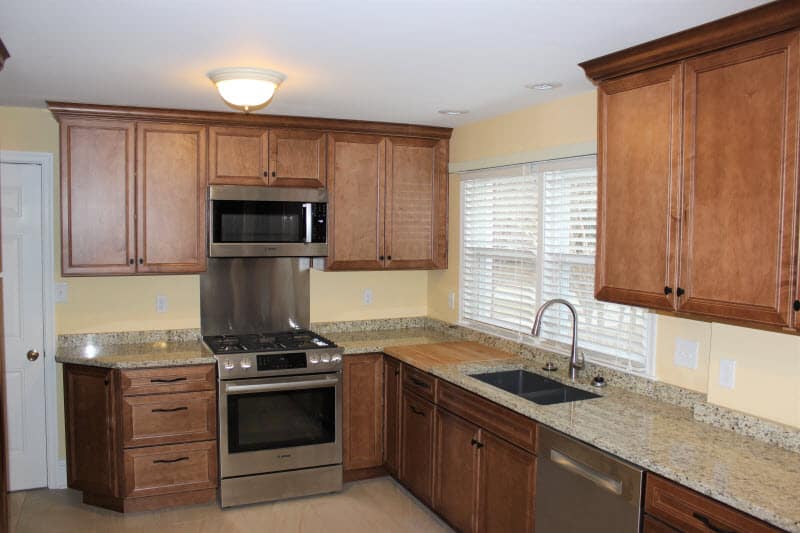A cooktop, also referred to as stovetop, is a surface that contains burners for cooking. Cooktops are either part of a larger stove or range appliance, or they are separate from the oven unit and built into a countertop area of the kitchen. Cooktops can be gas or electric, depending on the power hookup into your kitchen, and each type has its pros and cons. Here we examine both types.
Gas
The burners on gas cooktops put out an open flame that directly heats the bottom of a pan. Gas cooktops distribute heat evenly and allow the cook to adjust the height of the flame and quickly turn the heat up or down to maintain a full range of cook temperatures from simmer to boil.
The burners on a gas stove can be sealed or open. Open burners mean the flame is visible and provides direct heat to the pot or pan on top of the range. This enables cooks to see if the heat needs adjusting. With open burners, spills and food particles can drop easily into or around the flame. Sealed burners have a cover, or seal, between the burner and the pan holder frame. Since the flame is not open and exposed, food particles cannot fall into it, which means easier cleaning of the stove after a meal.
A gas stovetop’s ability to quickly heat food or boil water is determined by its BTUs. BTU stands for British Thermal Unit, and BTUs are indicative of the amount of heat the gas burners produce. In general, the range of BTU strength in gas cooktops is wide. According to kitchn.com, burners on the average gas stove have 7,000 BTUs. Professional and chef cooktop burners can have up to 18,000 BTUs and beyond.
Electric
There are several types of electric cooktops from which to choose. Before buying, it is wise to understand the differences, as not all electric cooktops are created equal and each provides a different cooking experience.
- Electric coil – Electric coil stovetops are usually less expensive than other electric stovetops, and they are also the easiest choice in terms of cleanup. Cooks need not be wary about using cast iron or other heavy skillets that could potentially scratch or damage other types of cooktops, as electric coil burners are quite durable. Electricity runs through the coils to heat pans, although uneven cooking can result if the coil is not distributed evenly or the coil is not level on the stove. Also, caution is necessary when the burner is turned off. If the pan is not removed, food continues to cook from the heat these burners retain.
- Smoothtop – Smoothtop cooktops are beautiful to look at, with a shiny, smooth surface that is flush against the counter. The burners are incorporated directly into the top, which means no food particles or liquid spills can get between them. But, smoothtops are made from glass, so cooks need to be careful with heavy cast iron or other rough skillets that could scratch the cook surface. The best way to clean a smoothtop cooktop is with a soft sponge and cleaning product that is specially formulated for glass or ceramic cooktops. Manufacturers recommend spills be cleaned up immediately to avoid permanent discoloration of the stovetop.
- Induction – Induction cooktops are unique in that burners provide heat only when the electromagnetic force in the burner comes into contact with specialty induction cookware (or other elements with
magnetic properties). The burners on an induction cooktop have no coil and put out no flame. They reach high temperatures more rapidly than other burner types which means food cooks more quickly. Similarly, once a pot is removed, the burner is cool to the touch practically instantaneously, which can be helpful in avoiding accidental burns. Induction cooktops, though usually more expensive than smooth cooktops, are gaining in popularity.
Modular
Get the best of several cooktop types by creating your own modular cooktop that incorporates your preferred stovetop elements – electric, gas, induction – into a customized cook unit. A kitchen specialist or qualified contractor can help you design the unit that meets all your cooking needs.
Sovereign Construction Services is a full-service building and remodeling company. Owner Steve Rush is well familiar with the different types of cooktops and ranges that can be installed in a kitchen. If you are looking to redo your kitchen or change out appliances, call Steve at 610-639-2986. He will make sure you understand the options available so you can make the best decision based on function, design, and budget

